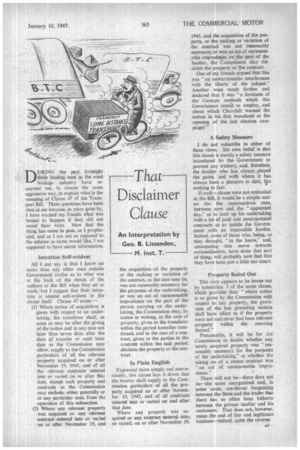That Disclaimer Clause
Page 35

If you've noticed an error in this article please click here to report it so we can fix it.
An interpretation by Geo. B. Lissenden, M. Inst. T. DUR1NG the past fortnight three leading men in the road haulage industry have requested me, in almost the same aggressive way, to explain what is the meaning of Clause 47 of the Transport Bill. These questions have been shot at me because, in years gone by, I have warned my Friends what was bound to happen if they did not mend their ways. Now that the thing has come to pass, as I prophesied, and as 1 am not so opposed to the scheme as some would like, I am supposed to have secret information.
Intention Self-evident
All I can say is that I know no more than any other man outside Government circles as to what was at the back of the minds of the authors of the Bill when they set to work, but I suggest that their intention is atmost self-evident in the clause itself. Clause 47 states:— (1) Where notice of acquisition is given with respect to an undertaking, the transferor shall, as soon as may be after the giving of the notice and in any case not later than seven days after the date of transfer or such later date as the Commission may allow, supply to the Commission particulars of all the relevant property acquired on or after November 19, 1945, and of all the relevant contracts entered into OT varied on or after that date, except such property and contracts as the Commission may exclude, either generally or in any particular case, from the operation of this subsection.
(2) Where any relevant property was acquired or any relevant contract entered into or varied on or after November 19, and • the acquisition of the property or the making or variation of the contract, as the case may be, was not reasonably necessary for the purposes of the undertaking, or was an act of unreasonable imprudence on the part of the person carrying on the undertaking, the Commission may, by notice in writing, in the case of property, given to the transferor within the period hereafter mentioned, and in the case of a contract, given to the parties to the contrail within the said period, disclaim the property or the contract.
In Plain English
Expressed more simply and conveniently, this clause lays it down that the haulier shall supply to the Commission particulars of all the property acquired on or after November 19, 1945, and of all contracts entered into or varied on and after that date.
Where any property was acquired or any contract entered into,. or varied, on or after November 19,
1945, and the acquisition of the property, or the making or variation of the contract was not reasonably necessary, or was an act of unreasonable imprudence on the part of the haulier, the Commission may disclaim the property or the contract.
One of my friends argued that this was "an unwarrantable interference with the liberty of the subject." Another went much farther and declared that it was "a foretaste of the Gestapo methods which this Government intedd to employ, and about which Churchill warned the nation in his first broadcast at the opening of the last election campaign!"
A Safety Measure I do not subscribe to either of these views. My own belief is that this clause is merely a safety measure introduced by the Government to prevent any trickery, and, therefore, the haulier who has always played the game, and with whom it has always been a pleasure to deal, les nothing to fear.
If such a clause were not embodied in the Bill, it would be a simple matter for the unscrupulous man, between now and the "appointed day," so to load up his undertaking with a lot of junk and uneconomical contracts as to saddle the Government with an impossible burden. Indeed, some of those who, being, as they thought, iii the know," and, anticipating this move towards nationalization, have done that sort • of thing, will probably now find that • they have been just a little too smart.
• Property Ruled Out .
This view appears to be borne out by subsection 3 of the same clause, which provides that: where notice is so given by the Commission with respect to any property, the provision of the last preceding section shall have effect as if the property were not and never had been relevant property within the meaning thereof."
Presumably, it will be for the Commission to decide whether any newly acquired property was "reasonably necessary for the purposes of the undertaking," or whether the taking on of a recent contract was "an act of unreasonable impru dence." • There will not be—there dare not be—the same unorganized and, in some cases, cut-throat bargaining between the State and the trader that there has so often been hitherto between the private haulier and his customers. That does not, however, mean the end of fair and legitimate business—indeed, quite the reverse.




















































































